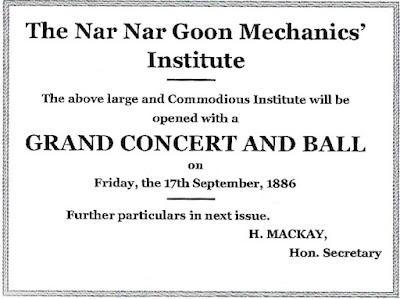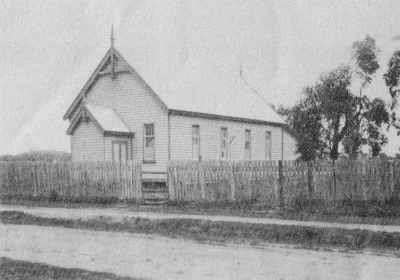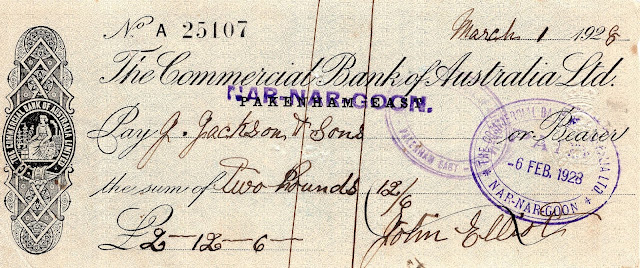The Nar Nar Goon Mechanics' Institute was officially opened on September 17, 1886. The building was located in Racecourse Road, just to the west of the current Post Office. The South Bourke & Mornington Journal reported on the opening.
NAR NAR GOON MECHANICS' INSTITUTE.The opening of the above hall took place on Friday evening, 17th inst., by a concert and ball. The hall was festooned with flags and the walls decorated with mountain and coral ferns, intermixed with wild heath, while two mountain ferns stood on each side of the stage. Practically speaking the building presented on Aden like appearance. The Hon. Dr. Dobson, M.L.C,, presided, and in his address said it gave him great pleasure in being able to come before the people of Nar-Nar-Goon, it being portion of his constituency, and he was very pleased to see such a noble edifice raised by the people of the district. The concert, which was a well-arranged one, in which Mr H. Allnut and the Misses Brooks took part, was then proceeded with, and passed off very satisfactorily. At the conclusion the hall was put in order for dancing, which was kept up till a late hour, Mr. McRae acting as M.C.--Mr. McKay gave great satisfaction in conducting the concert. The entertainment as a whole was quite a success, and passed off pleasantly (1).
Dances and concerts were held there, especially during the First World War to raise funds for patriotic causes and in 1914 it was reported that A syndicate has been formed at Narnargoon, and during the winter months skating will be indulged in at the Public Hall. A start will be made next Saturday night, April 4th. The price of admission is 6d, skates 6d, and floorage 6d. extra. Mr. F. N. Chatfield is the manager (9). This was roller skating, a popular past-time in those days.
Nar Nar Goon Memorial Hall - Opening ceremony
Friday last was a red letter day in the history of Nar Nar Goon, the occasion being the opening of the Soldiers’ Memorial Hall and the unveiling of an Honor Board.
The young men
of the district were quick to respond to the call of duty during the war period
51 enlisted
and 11 paid the supreme sacrifice – and it was only fitting that the people of
the district should show their appreciation of the gallant services rendered by
the lads on their behalf and on behalf of the Empire as a whole.
During the
past five years the residents have marked their appreciation in various ways –
by farewells to the men who enlisted, by joyous welcomes to those who returned
after taking part in the battle for freedom and liberty, by Red Cross efforts,
and by assistance to the hospitals and rest homes that have been established to
help those men who were disabled in the fight. Generous support has been given
by the residents of the district to every effort put forward, and there has always been a band of
energetic workers ready to help forward every movement initiated.
The war
being over the question of establishing
a suitable memorial in honor of the soldiers was discussed, and it was eventually decided
to purchased the public hall and renovate it. This had been done and Nar Nar
Goon has a hall that any district might justly feel proud of. It is attractive
and well appointed, and on Friday the Australian flag was flying from its
flagstaff.
As anticipated,
the opening ceremony attracted a large attendance and great interest was taken in the proceedings.
Brigadier-General Grimwade wrote stating that he was sorry that he unable to be present, owing to a prior engagement. He wished the residents of the district every success. Mr W.F. Startup, J.P., president of the league, occupied the chair. The school children marched into the hall to the strains of “Men of Harlech” and proceedings were then opened with the singing of the National Anthem.
The chairman
said that it was with a feeling of relief to the committee that the time had
arrived for the opening of the hall. The hall was finished in February, and ready
for the opening ceremony, but the delay had been caused in connection with the
Honor Board, which had just come to hand. He said the movement to assist the
solders was started about three years ago, toward the close of 1917. A league
was then formed in Nar Nar Goon to arrange for farewelling and welcoming soldiers
and to assist in settling returned soldiers in the district. In 1918 a public
meeting decided to hand this work over to what was known as the Nar Nar Goon
Soldiers’ League, which was comprised of private citizens who undertook to help
the soldiers. Later on it was recognised that this name gave a wrong impression,
as it was not a soldiers’ league and it was then decided to adopt the present
name Nar Nar Goon Soldiers’ Memorial League.
When the
question of erecting a soldiers’ memorial was first discussed there was a
difference of opinion as to the form it should take. About this time the hall
became available, and it was decided to buy it, renovate it and make it worthy
of the soldiers’ cause. It had been purchased and renovated and was now an
ornament to the town. It could be used by the soldiers and their dependents and
also by members of the general public, and the committee believed that all will
agree that it was a fitting memorial for the soldiers and one that would
compare favourably with memorials erected in other parts of the State.
As regards
the financial position, he pointed out that before the hall was purchased an
allotment of land adjoining was presented to the committee by Miss and Mr O’Brien,
as a site for a memorial, and when it was agreed to buy the hall they
generously allowed their gift to stand. The hall and half an acre of land had
cost £200, and the total outlay for purchase and renovation was approximately
about £640. Against that sum about £380 had been raised, leaving an
overdraft of about £200. The property was not mortgaged,
the amount of the overdraft being guaranteed by 15 or 16 residents. Of the sum
raised £112 had been received in donations. A number of persons in the district
had not given a donation because they had not been asked. To these he wished to
say that either he or their energetic secretary– Mr J.R. Spencer – would be
pleased to receive donations toward this fund.
Mr Frank
Groves, M.L.A., said it gave him great pleasure to be present at the opening of
their memorial hall. They recognised by the remarks of the chairman that the
committee had done large amount of work
and had done it well. It was their duty to stand by the committee, as the
movement could not be made a success without the co-operation of the whole of
the people. All had received a great advantage by the work done by the
soldiers. All had benefitted by their glorious achievements, and it was their
bounden duty to help. The soldiers had laid the foundation stone of new
nation for us but this could only be built up while the Union Jack was flying
over it. Those who thought otherwise were living in a fool’s paradise. It was
necessary that we should be a united nation and any undermining influence must
be stamped out. He appealed to the people to give the committee every
assistance.
The Hon. A.E. Chandler, M.L.C., said the committee had
fixed on an appropriate time for the opening of their hall as the people were
about to commemorate some of the bravest deeds in British history, when some of
our boys scaled the cliffs at Gallipoli. By that act we had lost many of
Australia’s best, and it fell to our duty to see that those they left behind
were properly cared for. Many overlooked the fact that provision had been made
by the Federal government for the education of the children of soldiers who had
fallen. It was up to the people to see that these children got what they were
entitled to. The Australians had proved themselves soldiers and men and had
conquered where others had failed. The speaker then went on to refer to the
need for more population in Australia, and also the need for spending more
money in reproductive works.
Cr Chas.
Pearson congratulated the people of Nar Nar Goon on having such a fine hall. He did not know whether they had
a library, but if not he advised them to get one as quickly as possible. A
library was a great boon in any town, both to young and old. All agreed that
the soldiers had done their work nobly, and we were under a debt of gratitude
to them, as well as to the sailors, the nurses and the great army of workers
who had take their part in the great war.
The
chairman then called on Lieut. Mays to perform the ceremony of unveiling the
Honor Board.
Lieutenant
Mays said this duty was one that most soldiers liked to shirk, if possible. It
was a sad duty but it had to be performed. On the Honor were the names of 51 gallant boys who had left Nar Nar Goon, and of these
11 had failed to return. They were all fine fellows, and the people were proud
to know and live with them, and if needs be to die with them. They had died for the liberty and
Christianity of the British Empire. 60,000 of Australia’s noble dead had given
their lives in Egypt, Mesopotamia or France, and there were memorials all over
the country to perpetuate their memory and brave deeds.
On the 25th
of April, 1915 – a Sunday morning – the cliffs of Gallipoli were scaled, and
not all who went out returned. He extended his deepest sympathy and the
sympathy of the people to the relatives of the fallen – the men who gave of
their best – their all. The people of Nar Nar Goon desired to keep their memory
green, and that was why the hall had been bought, renovated and handed over by
patriotic citizens. The soldiers at
Gallipoli had shown the true fighting spirit and were never down-hearted. They
fought shoulder to shoulder for the British Empire. There was no sectarianism
and there were no political parties; and this was at it should be in Australia.
They fought for the great cause of
freedom. When the Union Jack falls, said the speaker, it will be an end to all
the great ideals of the Commonwealth. Referring to the Honor Board, he said
memorial halls and tablets will decay, the written history of the war may be
destroyed, but the memory of the deeds of our soldiers will live forever.
THOSE WHO RETURNED
THOSE WHO MADE THE SUPREME SACRIFICE
Child, A. / Dore, D.J. / Harris, L. / Lamb, C.H. / Madden, T. / Nash, H. / Ord, A.L. / Olsen, C.C. / Pepper, H.H. / Smith, J.F. / Taylor, W.D.
Mr Fink returned thanks on behalf of the soldiers for the many kind things said by the speakers and for the interest generally taken on behalf of the returned men. He said that some people often criticised the actions of the soldiers, but if they only thought for a moment of the conditions the men had passed through, both mentally and physically, while in Egypt and France they would be more sympathetic. After referring to some of his experiences in France he again thanked all for their efforts on behalf of the soldiers.
The chairman, in moving a vote of thanks to the speakers,
said he had forgotten to refer to the new piano .This, he said, has been
obtained mainly through the energetic work of Mr W. Kenny and Mr H. Spencer,
jun. By collecting and other efforts they had been able to present the committee
with a piano, with crockery, and also with utensils, the whole costing
considerably over £100. For their good work they were created
life members of the League. Cr Stephenson had also helped them in connection
with the building of the hall, and as he was present he was sure all would be pleased
to hear an address from him.
Cr Stephenson
said he was pleased to be present, and he thanked them for the honor of taking
part in the celebration in connection with their hall. Opinions differed, he
said, as to the form memorials for our soldiers should take. Some favoured
halls others drinking fountains, memorial parks or stones. But to his mind it
did not matter much which form the memorial took – it was the spirit which
prompted the movement. No doubt it was pleasing to returned men to see their
efforts on behalf of the people were greatly appreciated. Referring to the incapacitated
soldiers, especially those who had lost their sight or their limbs, he said
nothing the people could do would compensate them, but it was our duty to see
that they lived in comfort and had all they required. Speaking of their new
hall he said the amount for renovating it might seem large, but they had to take
into consideration the high cost of material. He could assure them that prices in
every instance were cut down to bedrock and that not one penny was wasted in
the work.
Mr R.
Raftis, in seconding the vote of thanks, referred to the good work of the
secretary in arranging for the opening ceremony, and his inability to get the
services of any leading military officer, as all were engaged in connection
with the Anzac celebrations. He also said the committee and people of the
district were under debt of gratitude to Cr Stephenson for the assistance he
had given in connection with the renovation of the hall. Although a busy man he
had found time to come and assist them, and helped to get the building completed
much sooner than it would otherwise have been. All, he said, were delighted
with the hall. He had great pleasure in seconding the vote of thanks.
Mr Groves, in returning thanks for the speakers, made special reference to the manner in which Lieutenant Mays had performed his duty of unveiling the Honor Board. He said the people were more indebted to Mr Mays than they would be to one of the heads of the military department. He was sure all were greatly pleased with the way in which he did his work and they appreciated his action of coming forward at the last moment. At the close of the proceedings afternoon tea was served by the ladies and was greatly appreciated.
In the evening a grand concert was held when there was a crowded hall. A very fine programme was given by the following artists: - Miss I. Hughson, Miss Emily Mitchell, Miss Ida Mitchell, Mr Sherwood and Mr W. Mitchell. The various items were greatly appreciated.,
At the
close an enjoyable dance was held, which also attracted a very large
attendance. Splendid music was rendered by Mr Dug Lancefield, assisted by Mr T. McGrath . Mr W. Kenny was an efficient M.C. The floor was in excellent
order and dancing was kept up to 3 a.m.
The best
thanks are due to the President and committee who had charge of the days arrangements
and to the ladies for their valuable assistance. To the hon. sec. (Mr J.R.
Spencer, J.P.) special thanks are due
for his energetic and untiring work.
I have written about the soldiers on the Nar Nar Goon Honour Board, here.
The Trustees for the Soldiers' Memorial Hall were John Dore, W. Carney, R. Raftis, C. Davis, John Smith, M. Cunningham and F. Chatfield (13). The last named Trustee, Fred Chatfield began organising dances and Euchre card games to raise money for the Hall in 1923. This money helped fund additions to the Hall such as the Supper room, kitchen and toilets. Like many country dances at the time, whenever a ball or dance was held Euchre was also on offer for the non-dancers. Fred continued to run the Euchre until 1972, when his son John took over. More recently another son Jim, took over the role (14).
Acknowledgment














































